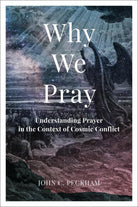Why We Pray
$24.99
Unit price
/
Unavailable
Shipping calculated at checkout.
Couldn't load pickup availability
Why We Pray
Couldn't load pickup availability
Baker Academic serves the academy and the church by publishing high-quality works that bring Christian faith to bear on the pursuit of knowledge, wisdom, and human flourishing.
Powered by Supadu
